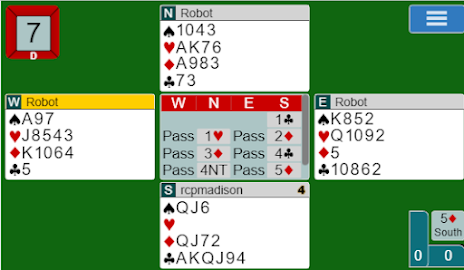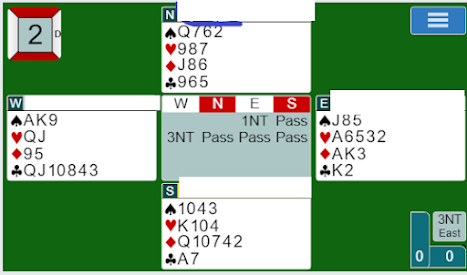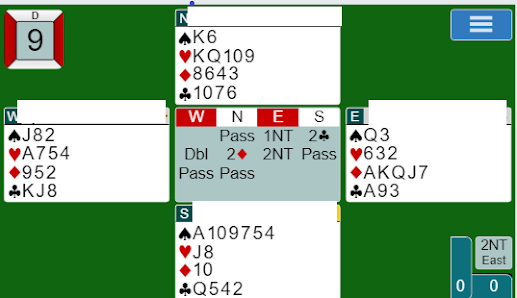Question:
In this board North had a first response choice between giving South an indication of points with a 1NT bid or telling North they had support for spades with a 3 spade bid. Do you have a preference in indicating points or supporting a suit on the first response and if so why?
Mark:
The big question is whether this partnership plays 1NT
forcing for one round, which is increasingly popular.
We'll assume
for the moment that 1NT is not forcing, and the partnership opens 5
card majors, which is nearly universal in the US, then 1NT denies holding 3
spades. Yes, there are hands, just as this one, where NT will take as many
tricks as spades and maybe more, but the specific card holdings that make that
work are nearly impossible for mere mortals to assess. Maybe world champions
can figure out the value of the 9 and 8 of clubs in the north, as well as the
extra favorable red suit location and the unfavorable spade break. I don't want
to try such a high- wire act and don't recommend it. The choice comes down to a
3 spade limit raise (I recommend not playing a raise to 3 as forcing) vs. going
directly to 4 spades. This hand is on the border, but you must do more with 12
high card points than make a non- invitational bid when your partner opens. The
reason I prefer going with invitation rather than bidding game unilaterally on
this hand, is the nature of the 12 points. They are "quacky", rich in
queens and jacks, which often do not pull their full weight in the play. A
doubleton QJ is especially doubtful to count as 3 points. Once North issues an
invitation in spades, I think South should definitely go to game with a nice,
non- "quacky" 14 points. When the invitation shows a spade fit, the
singleton club adds value.
Now, if N-S play that 1NT is forcing for a round, I'm
pretty comfortable with N's response of 1NT, intending next to show an
invitational hand with exactly 3 spades, as shown in the actual auction. This
is only true if S was required to bid over 1NT, not just that he happened to
have a secondary suit and wanted to show it. Technically, most pairs that play
1NT forcing, will jump to 3 of partner's opening major with the strength of
this N hand but with exactly a 4-3-3-3 totally flat hand. Some very good
players feel strongly that 4-3-3-3 is an absolute requirement. I give this
N bidding a pass, and actually kind of like it, again, assuming that 1NT was
forcing. I disagree with South's pass of 3 spades, even if playing 1 NT as
denying 3 spades as well as a decent 11 points. I would then assume N to have
the Q doubleton of spades and an absolute maximum for the 1NT, so I'd still bid
4 spades.
Looking at the 26 cards in the N-S and not knowing
anything about the location and distribution of the E-W cards, normal
probabilities make it about 60 % likely to take 10 tricks in spades and the
same 60% to take 9 tricks at NT. NT bidders are undeservedly lucky on the
actual hand, as they should take the same 10 tricks as in spades. Anyone who
fails to bid game will get the low score that the probabilities indicate. To
replay my broken record: Just get to the right level in your 8 card major suit
fit and don't try to thread the needle in NT. I tend to tempt fate in bidding
NT more than almost anyone I know, but I get punished plenty, so do as I say
and your results will be good.









